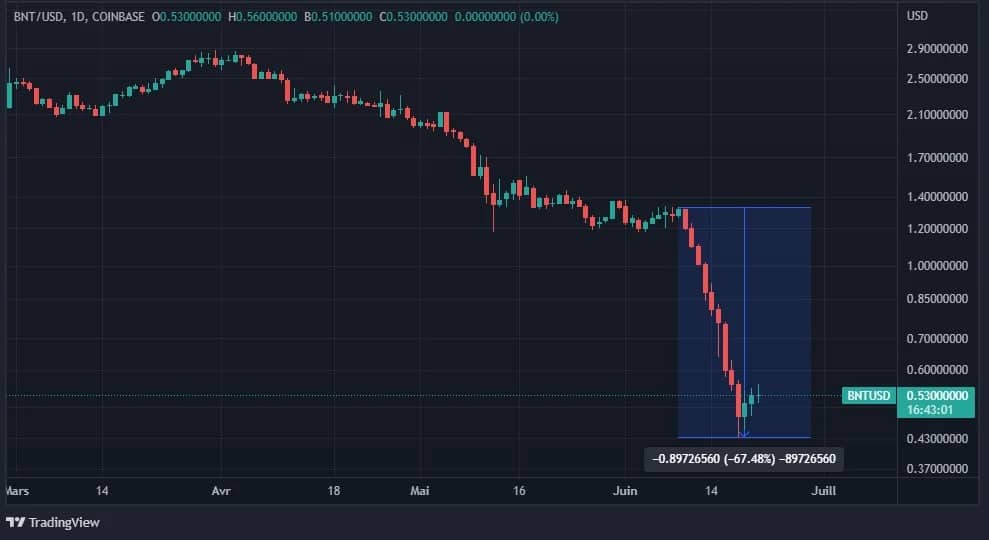In response to market conditions, the Bancor Protocol (BNT) has temporarily halted its impermanent loss protection feature. While this decision has the merit of allowing the platform to regain some stability, it could also cause its loss
Bancor temporarily suspends impermanent loss protection
Because of market conditions, Bancor has decided to temporarily stop its impermanent loss protection (IPL) feature:
Due to hostile market conditions, Bancor’s Impermanent Loss Protection is temporarily paused. IL protection will be reactivated on the protocol as the market stabilizes.
More info: https://t.co/pHrdO4sTFd
We’re hosting a community AMA in 15 minutes: https://t.co/xgh8UmfNoL
– Bancor (@Bancor) June 19, 2022
Bancor is a decentralised finance protocol (DeFi), whose added value lies precisely in this IPL. Impermanent loss is indeed a constraint in liquidity pools of assets whose prices move independently.
To keep it short, it is possible that if you put assets A and B together in a liquidity pool, you will get back your investment with a different value than if you had kept them separately in your portfolio. This is because the pool is constantly rebalancing to keep the ratio between the two assets the same despite the volatility.
This is why the Bancor IPL allows for financial compensation of this impermanent loss. Indeed, if this loss was not covered by the interest earned, the protocol would compensate it by distributing its BNT token. Thus, no money would be lost in dollar value.
However, the high volatility of the market has allowed a few players to accumulate a large number of BNTs. As Bancor points out, their massive sale amplifies the phenomenon of impermanent loss, generating more and more BNT and thus creating a vicious circle. The platform mentions two entities, which amplify the phenomenon:
“These costs have been amplified by the recent insolvency of two large centralised entities that were the main beneficiaries of BNT liquidity extraction rewards as longstanding [liquidity providers] in Bancor V2.1. “
While one of these entities is most certainly Celsius, we cannot determine at this time whether the second is Three Arrows Capital or not.
What are the risks of this decision?
By temporarily deactivating the ILP, Bancor says that if funds are withdrawn during this period, there will be no compensation in BNT. Thus, the platform initially hopes that these centralised players will stop systematically selling tokens.
However, this decision is double-edged, as it may also cause users to lose confidence in the protocol. But a third possible scenario would be even more damaging for the platform, as Matthias, one of our speakers on our private group, the Grille-Pain, explains in one of his daily posts:
“The last case is the following and it potentially leads to the end of the protocol: Bancor reactivates the ILP under user pressure and Celsius takes the opportunity to leave the platform and the users too. “
Indeed, such a purpose could lead to insolvency as well as a loss of control over the issuance of NTBs. Inflation would then be so great that its price would collapse even more violently than it has already done.
In its message, Bancor also informs that an unknown entity opened a large short position in parallel with the massive capital outflow, which pushed the developers to make their decision. The price of BNT lost more than 67% of its value between 10 and 18 June:

NTB price
While Bancor capitalized up to 2.42 billion in total locked-in value (LTV) in May 2021, that capital is ten times less a year later. Moreover, its flagship functionality, now paused, has shown its limits in a strong corrective market. Thus, the future of the protocol is uncertain, along with that of several players in the ecosystem.
